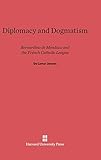Diplomacy and Dogmatism : Bernadino de Mendoza and the French Catholic Leaugue / De Lamar Jensen.
Material type: TextPublisher: Cambridge, MA : Harvard University Press, [2013]Copyright date: ©1964Edition: Reprint 2014Description: 1 online resource (322 p.)Content type:
TextPublisher: Cambridge, MA : Harvard University Press, [2013]Copyright date: ©1964Edition: Reprint 2014Description: 1 online resource (322 p.)Content type: - 9780674181274
- 9780674181281
- online - DeGruyter
| Item type | Current library | Call number | URL | Status | Notes | Barcode | |
|---|---|---|---|---|---|---|---|
 eBook
eBook
|
Biblioteca "Angelicum" Pont. Univ. S.Tommaso d'Aquino Nuvola online | online - DeGruyter (Browse shelf(Opens below)) | Online access | Not for loan (Accesso limitato) | Accesso per gli utenti autorizzati / Access for authorized users | (dgr)9780674181281 |
Frontmatter -- PREFACE -- CONTENTS -- ILLUSTRATIONS -- Chapter I. THE WARS OF RELIGION IN FRANCE -- Chapter II. FOUNDATIONS OF THE CATHOLIC LEAGUE -- Chapter III. MENDOZA AND FRANCE -- Chapter IV. MENDOZA AND GUISE -- Chapter V. DIPLOMATIC PROCEDURE, I: GATHERING DATA -- Chapter VI. DIPLOMATIC PROCEDURE, II: COMMUNICATION -- Chapter VII. THE REVOLT BEGINS -- Chapter VIII. TRIUMPH OF THE LEAGUE -- Chapter IΧ. MENDOZA LEADS THE PARIS LEAGUE -- Chapter X. THE STRUGGLE FOR A THRONE -- Chapter XI. COLLAPSE OF THE LEAGUE -- APPENDIX -- BIBLIOGRAPHY -- NOTES -- INDEX
restricted access online access with authorization star
http://purl.org/coar/access_right/c_16ec
This is the first study of Mendoza, the importance of whose position as Ambassador to France from 1584 to 1591--crucial in the liaison between Philip II and the French Catholic League--was long recognized but not explored. A religious zealot and military crusader who carried his uncompromising attitude into his diplomatic career, Mendoza made the connections between his master Philip and the French Catholic League much more intimate and functional than was previously suspected. In the spring of 1588, for instance, Mendoza manipulated the League and the Duke of Guise into a position of open rebellion against the King of France, thus ensuring that the Armada could sail for England without the danger of French harassment along the channel coast, and also that there would be no threat of French occupation of the Spanish Netherlands when Parma's troops should embark for the invasion of England. Throughout the book, Spanish policies and techniques and their influence on international affairs are exemplified as they were not before. Showing how Continental diplomacy was dominated by religious zeal in the late sixteenth century, and how the fanaticism of the French religious wars formed a prelude to a reaction toward political absolutism, Jensen draws on a fund of untapped manuscript and printed sources, including Mendoza's coded letters, some of which he was the first to decipher.
Mode of access: Internet via World Wide Web.
In English.
Description based on online resource; title from PDF title page (publisher's Web site, viewed 29. Nov 2021)


